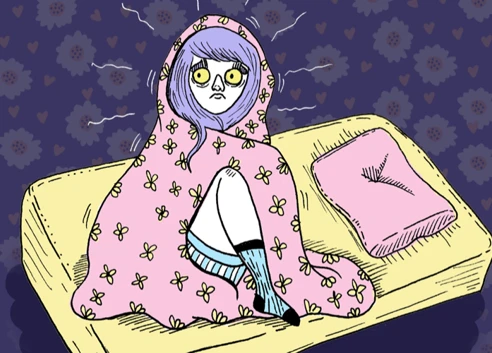At times, the unconscious mind can transport us to unsettling realms while we sleep, leaving us feeling anxious and disturbed upon waking. These frightening experiences, known as nightmares, have long intrigued psychologists and researchers. It is widely recognized that stress and nightmares are intimately connected, but the exact nature of this relationship remains mysterious. We delve into the depths of this enigmatic connection, exploring the role of stress in dream formation, understanding the types and effects of nightmares, the complex interaction between stress and nightmares, scientific explanations for this phenomenon, strategies for managing stress to alleviate nightmares, and the importance of seeking professional help when needed. Discover how this intricate web of stress and nightmares intertwines, and unlock the secrets to a more peaceful night’s sleep.
The Role of Stress in Dream Formation
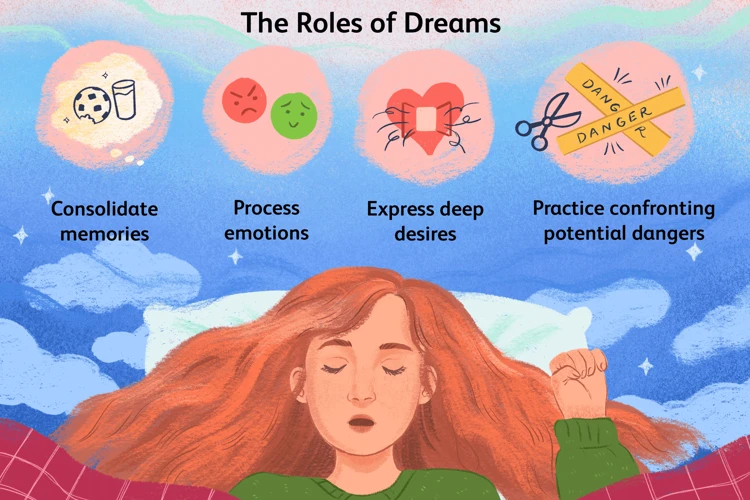
During periods of heightened stress, our minds can become a breeding ground for vivid and unsettling dreams. The role of stress in dream formation has long fascinated researchers and psychologists alike. Stress can impact the content, intensity, and frequency of our dreams, leading to a higher likelihood of experiencing nightmares. When we’re stressed, our brains are hyperactive, constantly processing and analyzing the events and emotions that have caused our stress. This mental turmoil can spill over into our dreams, resulting in distressing and nightmarish scenarios. Stressful situations and emotions can influence the themes and imagery of our dreams, sometimes amplifying feelings of anxiety, fear, or helplessness. This connection between stress and dream formation highlights the profound impact that our mental and emotional state can have on the content of our dreams. To learn more about managing stress and reducing the occurrence of nightmares, check out our article on sleep disorders and nightmares management.
Understanding Nightmares

Nightmares, the stuff of chilling tales and restless nights, are more than just fleeting bad dreams. Understanding nightmares involves exploring their definition, types, and the effects they have on our sleep quality. Nightmares are intensely vivid and distressing dreams that often leave us feeling scared, anxious, or overwhelmed upon awakening. They can vary in content, ranging from realistic scenarios to fantastical and surreal imagery. Nightmares can be categorized into different types, such as post-traumatic nightmares, recurrent nightmares, or sleep paralysis nightmares. These reoccurring nocturnal disturbances can disrupt our sleep cycle, leading to poor sleep quality and daytime fatigue. To unravel the mysterious triggers behind nightmares and their effects on our sleep, refer to our article on unraveling nightmare triggers.
Definition and Types
Nightmares, often associated with intense fear, anxiety, and distress, are vivid and disturbing dreams that occur during rapid eye movement (REM) sleep. The definition of nightmares can vary, but they generally involve a sense of danger, threat, or terror that can wake the dreamer with a sense of unease or terror. While nightmares can be a normal part of dreaming, recurrent and severe nightmares may indicate an underlying issue. There are different types of nightmares that individuals may experience. Anxiety dreams are characterized by a general feeling of unease and discomfort, often reflecting unresolved stress or concerns. Recurrent nightmares are repetitive in nature and can be related to past traumas or deeply-rooted fears. Night terrors, on the other hand, are intense episodes of fear or panic that occur during non-REM sleep and are often accompanied by physical symptoms such as increased heart rate and screaming. To explore the influence of medication on dream content and the effects of nightmares, read our article on medication, dream content, and nightmare effects. Understanding the different types of nightmares can help individuals navigate their dream experiences and recognize when they may need further support or intervention.
The Effects on Sleep Quality
The effects of nightmares on sleep quality can be profound, causing significant disruptions to our restorative sleep cycles. When we experience nightmares, our sleep becomes fragmented as our minds are startled awake by the vivid and distressing imagery. This interruption in sleep can lead to difficulty falling back asleep, resulting in overall reduced sleep duration. Additionally, nightmares can induce intense emotions such as fear, anxiety, and sadness, causing physiological arousal and an increased heart rate. This heightened state of arousal can further interfere with the quality of our sleep, making it more difficult to enter into deep and restful REM sleep. As a result, individuals who frequently experience nightmares may wake up feeling exhausted and fatigued, impairing their overall well-being and cognitive functioning. Managing nightmares and improving sleep quality are important for maintaining optimal health. For more insights into unraveling nightmare triggers and techniques for improving sleep, continue reading our article on unraveling nightmare triggers.
Stress and Nightmares: The Complex Interaction
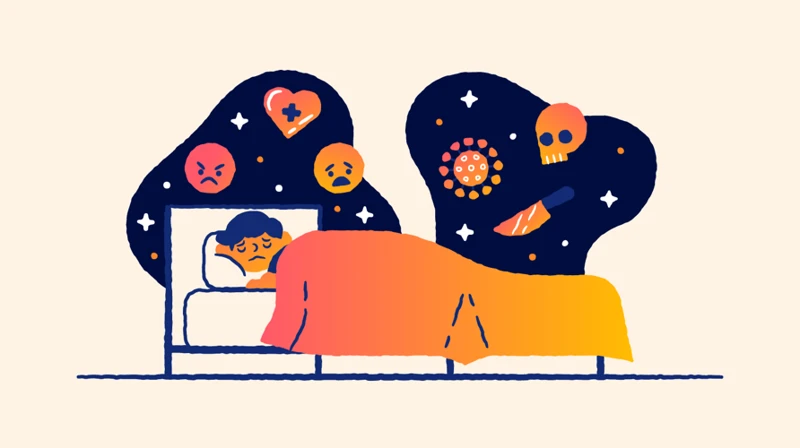
The relationship between stress and nightmares is a complex and intricate one. Stress can act as a trigger for nightmares, while nightmares, in turn, can intensify feelings of stress, creating a vicious cycle. When we are under significant stress, our minds may become more susceptible to experiencing nightmares during sleep. The emotional and psychological strain we endure can manifest in our dreams, leading to unsettling and distressing scenarios. These nightmares can then feed into our stress levels, as they disrupt our sleep and leave us feeling anxious and agitated upon waking. This interplay between stress and nightmares highlights the importance of addressing both factors to break free from this cycle. Understanding and managing stress, as well as finding strategies to alleviate nightmares, are crucial steps towards achieving restful and peaceful sleep.
Stress as a Trigger
Stress can act as a powerful trigger for nightmares, setting off a cascade of unsettling dream content. When we experience stress, our bodies release stress hormones like cortisol, which can disrupt the normal sleep cycle and impact the quality of our rest. As a result, our sleep becomes more fragmented, and we enter into periods of lighter sleep where dreams are more likely to occur. Additionally, stress can activate the amygdala, the part of our brain responsible for processing emotions, memories, and fear responses. This heightened activation of the amygdala can lead to the creation of vivid and intense dream scenarios, often involving situations that reflect our deepest fears and anxieties. The emotional weight of stress can also make it more difficult for us to process and resolve these fears during our dreams, further contributing to the frequency and intensity of nightmares. Understanding stress as a trigger is crucial in managing and alleviating the occurrence of nightmares. By implementing stress reduction techniques and developing healthy coping mechanisms, we can minimize the impact of stress on our dream states and foster more peaceful and restorative sleep.
Nightmares as a Manifestation
Nightmares serve as manifestations of our deepest fears and anxieties, often reflecting the stresses we experience in our waking lives. These haunting dreams can be incredibly vivid and disturbing, leaving us with a sense of unease even after we wake up. Nightmares typically involve intense emotions, vivid imagery, and a sense of danger or threat. They can range from scenarios of being chased or attacked to feelings of being trapped or powerless. Nightmares have the ability to disrupt our sleep patterns and quality, leading to further anxiety and sleep disturbances. The experience of a nightmare can leave us feeling shaken, anxious, and even physically aroused as our sympathetic nervous system responds to the perceived threat. It’s important to note that nightmares are different from regular dreams in terms of their intensity and the emotional response they evoke. Some nightmares may be a result of specific traumatic events or past experiences, while others may be a reflection of more general underlying stressors in our lives. Understanding and addressing the underlying causes of our nightmares is crucial in order to alleviate their impact on our mental well-being.
The Vicious Cycle
The relationship between stress and nightmares can create a vicious cycle that perpetuates both conditions. When stress levels are elevated, it can lead to an increase in nightmares. The emotional distress and disturbance caused by nightmares further contribute to heightened stress levels. This cycle begins when stress triggers the occurrence of nightmares during sleep. These nightmares, often filled with intense fear, anxiety, or trauma-related imagery, can lead to disrupted and poor-quality sleep. As a result, individuals wake up feeling exhausted, irritable, and even more stressed than before. The lack of restorative sleep further exacerbates stress levels, making individuals more susceptible to experiencing nightmares once again. This ongoing cycle can create a significant impact on overall mental well-being and sleep quality. Breaking this cycle requires addressing and managing both stress and nightmares simultaneously. By implementing stress reduction techniques, establishing a bedtime routine, and creating a relaxing sleep environment, individuals can disrupt the vicious cycle and promote better sleep and emotional well-being.
Scientific Explanations
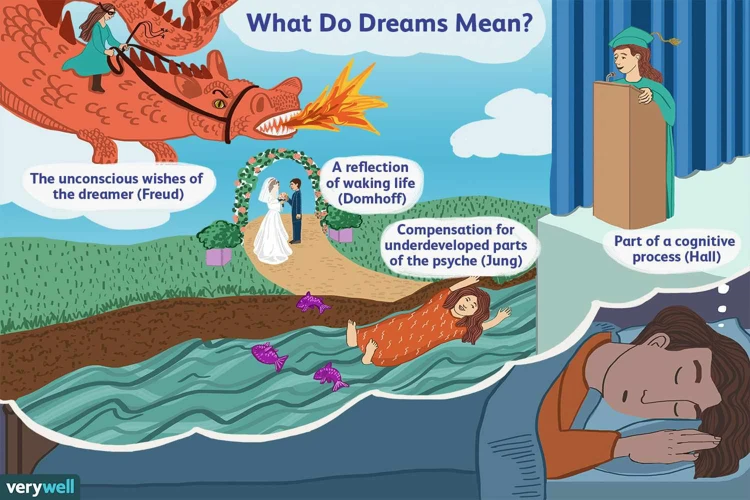
To truly understand the connection between stress and nightmares, we must delve into the scientific explanations underlying this phenomenon. Neurological factors play a significant role in shaping our dreams, as certain brain regions involved in emotional processing, such as the amygdala and hippocampus, can become hyperactive during times of stress. This heightened neural activity can lead to the creation of more intense and emotionally charged dream experiences. Additionally, hormonal influence cannot be overlooked, as stress activates the release of stress hormones like cortisol, which can disrupt the natural sleep cycle and contribute to the occurrence of nightmares. Psychological mechanisms, such as the interpretation and processing of stressful or traumatic events during sleep, can also contribute to the emergence of nightmares. Understanding these scientific explanations provides valuable insights into the complex interplay between stress and nightmares, shedding light on potential avenues for managing and mitigating these unsettling nighttime experiences.
Neurological Factors
Neurological factors play a significant role in explaining the connection between stress and nightmares. One key factor is the activation of the amygdala, an almond-shaped structure in the brain responsible for processing emotions and triggering the fight-or-flight response. During times of stress, the amygdala becomes hyperactive, leading to an increase in emotional arousal and the likelihood of experiencing distressing dreams. Additionally, the prefrontal cortex, which is responsible for logical thinking and decision-making, may become less active during periods of stress. This can result in a lack of control over the content and narrative of dreams, making them more chaotic and intense. Neurotransmitters like serotonin and norepinephrine also come into play. Stress can disrupt the normal balance of these chemicals, influencing sleep patterns and dream content. Serotonin, known as the “feel-good” neurotransmitter, regulates mood and sleep, while norepinephrine is involved in the stress response. Imbalances in these neurotransmitters can contribute to the development of nightmares. Understanding the neurological factors involved in stress and nightmares provides valuable insight into the intricate workings of the human brain and its influence on our dream experiences.
Hormonal Influence
The influence of hormones on the relationship between stress and nightmares is a fascinating aspect to explore. Hormonal fluctuations, particularly those related to stress, can significantly impact our dream content and overall sleep experience. When we experience stress, our body releases stress hormones such as cortisol and adrenaline. These hormones can alter our brain activity during sleep, leading to more vivid and intense dreams. Additionally, stress hormones can disrupt the normal sleep cycle, increasing the likelihood of experiencing nightmares during the REM (rapid eye movement) stage of sleep. This hormonal influence on dream formation can be further enhanced by the presence of certain medications, such as antidepressants or beta-blockers, which can also affect hormone levels. In some cases, medication-induced hormonal changes can lead to vivid dreams or nightmares. Understanding the hormonal influence on dream content can provide valuable insights into the complex connection between stress and nightmares. For more information on the influence of medication on dream content and its potential effects on nightmares, refer to our article on medication, dream content influence, and nightmare effects.
Psychological Mechanisms
Psychological mechanisms play a crucial role in understanding the connection between stress and nightmares. One such mechanism is the process of emotional regulation. When we are stressed, our ability to regulate and manage our emotions may become compromised. This can result in an overflow of negative emotions, such as fear and anxiety, which often find expression in our dreams. Additionally, stress can lead to increased rumination, where we repeatedly think about and analyze stressful events. This rumination can manifest in our dreams, causing them to revolve around the source of our stress. Cognitive mechanisms, such as attention and memory biases, can also contribute to the formation of stressful dreams. When we are stressed, our attention may be hyper-focused on potential threats or dangers, and this heightened vigilance can carry over into our dreams. Similarly, stress can affect our memory consolidation processes, resulting in the incorporation of stress-related experiences into our dream content. These psychological mechanisms showcase the intricate ways in which stress influences the content and themes of our dreams, potentially leading to the occurrence of nightmares. Understanding these mechanisms can provide valuable insights into the relationship between stress and nightmares, empowering individuals to take proactive steps in managing their stress levels and promoting more peaceful and restorative sleep.
Managing Stress to Alleviate Nightmares
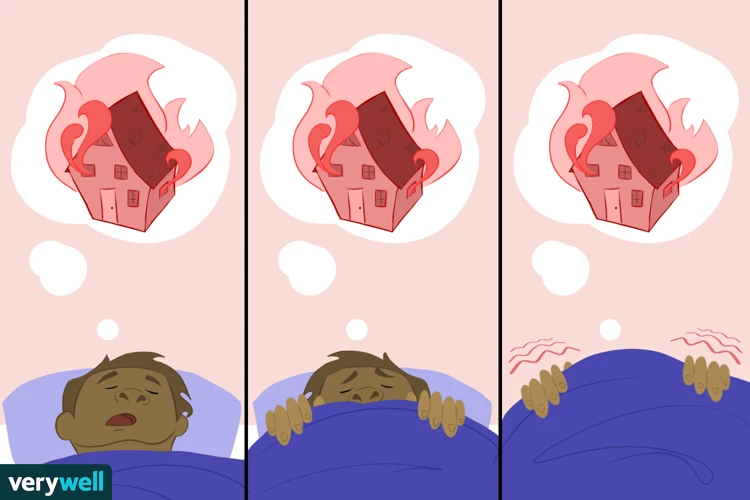
To alleviate nightmares, it is crucial to address and manage underlying stress levels effectively. Stress reduction techniques can play a significant role in promoting a more peaceful sleep experience. Engaging in activities such as deep breathing exercises, meditation, yoga, or mindfulness can help calm the mind and relax the body, reducing overall stress levels. It is also beneficial to establish a consistent bedtime routine that incorporates relaxation practices, such as reading a book or taking a warm bath. Creating a relaxing sleep environment by ensuring the bedroom is dark, quiet, and at a comfortable temperature can further promote a sense of calmness. Additionally, avoiding stimulating activities before bed, such as using electronic devices or consuming caffeine, can help prepare the mind for restful sleep. With these strategies, individuals can take proactive steps towards managing stress and creating a sleep environment conducive to alleviating nightmares.
Stress Reduction Techniques
When it comes to reducing stress to alleviate nightmares, there are several techniques that can provide significant relief. Here are some stress reduction techniques that can help promote a peaceful sleep and minimize the occurrence of nightmares:
1. Deep Breathing: Deep breathing exercises help activate the body’s relaxation response, reducing stress and anxiety levels. Take slow, deep breaths, focusing on inhaling through your nose and exhaling through your mouth. This technique can help calm your mind and prepare your body for a restful sleep.
2. Meditation: Practicing meditation regularly can help train the mind to let go of stress and promote a sense of inner calm. Find a quiet and comfortable space, close your eyes, and focus on your breath or a specific calming mantra. Meditation can help quiet racing thoughts, reduce stress, and improve overall sleep quality.
3. Progressive Muscle Relaxation: This technique involves systematically tensing and then relaxing different muscle groups in the body. Start from your toes and work your way up to your head, tensing each muscle group for a few seconds before releasing the tension. Progressive muscle relaxation can help release physical tension, promoting relaxation and reducing stress.
4. Exercise: Engaging in regular physical activity can help reduce stress and improve sleep quality. Exercise releases endorphins, the body’s natural mood boosters, and promotes a greater sense of well-being. Whether it’s a brisk walk, yoga, or any form of exercise you enjoy, incorporating physical activity into your routine can significantly reduce stress levels.
5. Journaling: Writing down your thoughts and feelings in a journal before bedtime can help clear your mind and relieve stress. Use the journal as a space to vent, reflect on your day, or jot down any worries or concerns. This practice can help you process your emotions and promote a more relaxed state before sleep.
By incorporating these stress reduction techniques into your daily routine, you can create a more peaceful and harmonious environment for sleep, reducing the likelihood of nightmares. Experiment with different techniques and find what works best for you in managing stress and promoting restful sleep.
Establishing a Bedtime Routine
Establishing a consistent and soothing bedtime routine can be highly beneficial in managing stress and reducing the likelihood of nightmares. Our bodies thrive on routine, and adhering to a structured pre-sleep ritual can signal to our minds and bodies that it’s time to relax and unwind. Start by setting a regular sleep schedule, going to bed and waking up at the same time each day, even on weekends. This helps regulate our internal body clock, promoting better sleep quality. Prioritize winding down activities in the hour before bedtime, such as reading a book, taking a warm bath, or practicing relaxation techniques like deep breathing or gentle stretching. Engaging in activities that promote relaxation can effectively reduce stress levels, helping to create a calm and peaceful mindset before sleep. Avoid stimulating activities or electronic devices close to bedtime, as they can interfere with the body’s natural sleep-wake cycle. Dimming the lights in the evening and creating a cozy sleep environment can further enhance relaxation. Implementing a consistent bedtime routine and creating a peaceful atmosphere can contribute to a restful night’s sleep, ultimately reducing stress levels and minimizing the occurrence of nightmares.
Creating a Relaxing Sleep Environment
Creating a relaxing sleep environment is crucial for promoting restful sleep and decreasing the likelihood of experiencing nightmares. Your sleep environment should be a sanctuary, free from distractions and stressors that can interfere with your ability to fall and stay asleep peacefully. There are several key factors to consider when optimizing your sleep space. Firstly, make sure your bedroom is cool, dark, and quiet. Use blackout curtains or an eye mask to block out any unwanted light, and consider using earplugs, a white noise machine, or a fan to drown out any disruptive sounds. Secondly, invest in a comfortable mattress and pillows that adequately support your body, allowing for proper spinal alignment and reducing any physical discomfort that may disrupt your sleep. Additionally, keep your bedroom clutter-free and organized, as a tidy space can contribute to a sense of calm and relaxation. Consider incorporating soothing elements, such as relaxing colors, soft lighting, and pleasant aromas, into your bedroom decor. Lavender, for example, is known for its calming properties and may help promote a more serene sleep atmosphere. Lastly, establish a consistent bedtime routine that signals to your brain and body that it’s time to unwind and prepare for sleep. This may include activities such as reading a book, taking a warm bath, or practicing relaxation techniques like deep breathing or mindfulness meditation. Creating and maintaining a peaceful sleep environment can significantly contribute to reducing stress and creating a conducive atmosphere for dream formation that is less likely to induce nightmares.
Seeking Professional Help
When nightmares become persistent and significantly impact your quality of life, seeking professional help is a crucial step towards finding relief. While occasional nightmares are considered normal, recurring and distressing nightmares can be indicative of underlying psychological issues that need attention. Therapists and counselors specializing in sleep disorders and trauma can provide valuable guidance and support. Cognitive-behavioral therapy (CBT) has shown promising results in treating nightmares, where therapists work with individuals to identify and reframe negative thought patterns and fears associated with the nightmares. Additionally, techniques such as image rehearsal therapy (IRT) can be employed to rewrite the content of nightmares, replacing them with more positive and manageable scenarios. Medication, such as prazosin, may be prescribed in specific cases to alleviate nightmares related to post-traumatic stress disorder (PTSD). Remember, seeking professional help is a sign of strength and a proactive approach to improving your well-being. If you’re interested in learning more about the influence of medication on dream content and its potential effects on nightmares, read our article on medication, dream content influence, and nightmare effects.
Conclusion
In conclusion, the connection between stress and nightmares is a multifaceted phenomenon that underscores the intricate relationship between our mental and emotional states and the content of our dreams. Stress can act as a trigger for nightmares, amplifying feelings of anxiety and fear that manifest during sleep. Similarly, nightmares can be a manifestation of the stress and anxiety we experience in our waking lives, serving as a reflection of our deepest worries and concerns. This creates a vicious cycle, where stress leads to nightmares, and nightmares, in turn, contribute to increased stress levels. While the exact mechanisms behind this connection are still being explored, scientific explanations point to neurological factors, hormonal influence, and psychological mechanisms as potential contributors. Managing stress through various techniques, establishing a bedtime routine, and creating a relaxing sleep environment can help alleviate nightmares and promote better sleep quality. However, in cases where nightmares persist and significantly impact daily life, seeking professional help is crucial for proper diagnosis and treatment. By unraveling the complex interplay between stress and nightmares, we can gain insights into our subconscious mind and work towards achieving a more restful and peaceful sleep.
Frequently Asked Questions
What is the difference between a nightmare and a bad dream?
Nightmares and bad dreams are both unpleasant dream experiences, but there is a subtle distinction between the two. A bad dream is simply a dream that leaves you feeling uneasy or unsettled upon waking up. On the other hand, a nightmare is an intensely distressing dream that often involves feelings of terror, fear, or anxiety, and may even wake you up from sleep.
Can stress really cause nightmares?
Yes, stress can indeed contribute to the occurrence of nightmares. Stress activates the brain and affects our mental and emotional state, which can lead to an increase in the frequency and intensity of nightmares. When we are stressed, our minds may process and manifest our anxieties and fears during sleep, resulting in distressing dream experiences.
Are nightmares a sign of a mental health disorder?
While nightmares are a common experience, they are not always indicative of a mental health disorder. Nightmares can arise from various factors such as stress, trauma, medication, or even certain foods. However, recurring nightmares or those accompanied by other symptoms such as insomnia, anxiety, or depression may be a sign of an underlying mental health condition and should be addressed with a healthcare professional.
How can I reduce stress to alleviate nightmares?
Reducing stress can help alleviate nightmares. Techniques such as practicing relaxation exercises, engaging in regular physical activity, maintaining a consistent sleep schedule, and seeking social support can all help to reduce stress levels and promote better sleep quality.
Do certain medications influence dream content and increase the likelihood of nightmares?
Yes, certain medications can influence dream content and increase the likelihood of nightmares. Medications such as antidepressants, beta-blockers, and some sleep aids have been associated with vivid and unusual dream experiences. If you suspect that your medication is contributing to nightmares, it is important to consult with your healthcare provider to discuss alternatives or adjustments to your dosage.
Can recurring nightmares be a sign of unresolved trauma?
Yes, recurring nightmares can sometimes be a sign of unresolved trauma. Traumatic experiences can leave a lasting impact on our subconscious mind, and nightmares may serve as a way for the mind to process and attempt to cope with the trauma. If recurring nightmares are causing distress or interfering with daily life, seeking professional help from a therapist or counselor who specializes in trauma may be beneficial.
Are there any natural remedies or supplements that can help reduce nightmares?
While natural remedies and supplements are often sought for various sleep issues, such as insomnia, there is limited scientific evidence to support their efficacy in reducing nightmares specifically. However, practices such as mindfulness meditation, aromatherapy with relaxing scents like lavender, and maintaining a sleep-friendly environment can contribute to better sleep quality overall.
What is the significance of keeping a dream journal for analyzing stress-related nightmares?
Keeping a dream journal can be helpful in analyzing stress-related nightmares. Recording the details of your dreams can provide insights into recurring themes or patterns, enabling you to identify potential triggers and understand the connections between your dreams and daily stressors. It can also serve as a tool for discussing your dreams with a therapist or counselor, aiding in the exploration and resolution of stress-related issues.
Can practicing lucid dreaming techniques help control and minimize the impact of stress-related nightmares?
Practicing lucid dreaming techniques may offer some individuals the ability to exert control over their dreams, including stress-related nightmares. Lucid dreaming involves becoming aware that you are dreaming while still in the dream state, which can provide an opportunity to consciously alter the dream content or steer it in a more positive direction. However, mastering lucid dreaming requires practice and may not be effective for everyone.
When should I seek professional help for recurrent stress-related nightmares?
If recurrent stress-related nightmares are causing significant distress, impacting your ability to function during the day, or are accompanied by other symptoms like insomnia, anxiety, or depression, it may be appropriate to seek professional help from a mental health professional. They can provide guidance, support, and recommend appropriate treatments or therapies based on your individual needs.

